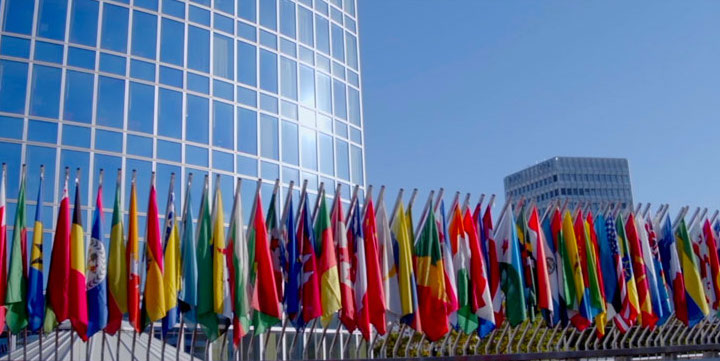“Prior to the COVID-19 crisis, the innovation landscape was flourishing, but now ‘the money to fund innovative ventures is drying up [and venture capital (VC)] deals are in sharp decline across North America, Asia, and Europe’, with the most negative effects being felt by ‘early-stage VCs, by R&D-intensive start-ups, and in countries that are not typically VC hotspots.’”
 Last week, the World Intellectual Property Organization (WIPO) issued the Global Innovation Index (GII) 2020 report jointly with Cornell University, INSEAD and the 2020 GII Knowledge Partners, which included The Confederation of Indian Industry, Dassault Systèmes – the 3DEXPERIENCE Company, and The National Confederation of Industry (CNI) – Brazil. The report showed that the United States remains in third place behind Switzerland and Sweden in WIPO’s ranking of global economies in terms of innovation capacity and output.
Last week, the World Intellectual Property Organization (WIPO) issued the Global Innovation Index (GII) 2020 report jointly with Cornell University, INSEAD and the 2020 GII Knowledge Partners, which included The Confederation of Indian Industry, Dassault Systèmes – the 3DEXPERIENCE Company, and The National Confederation of Industry (CNI) – Brazil. The report showed that the United States remains in third place behind Switzerland and Sweden in WIPO’s ranking of global economies in terms of innovation capacity and output.
Key Findings
The report focused on six key findings:
- The impact that the COVID-19 crisis will have on innovation and how leaders should respond as they move from containment to recovery;
- Innovation finance has been declining in during the COVID-19 crisis, but there is hope for improvement;
- The global innovation landscape is shifting, and China, Vietnam, India, and the Philippines are consistently on the rise in the innovation rankings over the past several years;
- Innovation performance in developing economies has been impressive;
- While regional divides still exist, “some economies harbor significant innovation potential”; and
- “Innovation is concentrated at the level of science and technology clusters in select high-income economies [with the addition of] China.”
With respect to the rankings, the report indicates that Switzerland, Sweden and the United States continue to lead, while the Republic of Korea has made it to the top 10 and India and the Philippines join the top 50. Noting that the countries leading the innovation rankings have “complementarity and balance across the different areas of their innovation system”, the report explains that other companies would benefit from their example and a “successful innovation system balances the forces that push knowledge creation, exploration, and investments—the innovation inputs— with the forces that pull ideas and technologies towards application, exploitation, and impact—the innovation outputs.”
Impacts of COVID-19 on Worldwide Innovation
According to the report, a key question it sought to answer was “how the economic fallout from the COVID-19 crisis will impact start-ups, venture capital, and other traditional sources of innovation financing.” In other words, “who will finance innovation?” Although many governments have set up emergency relief packages geared toward preventing short-to-medium-term harm to economies, the report advised that additional resources should be directed to prioritizing and broadening support for innovation, “particularly for smaller enterprises and start-ups that are facing hurdles in accessing rescue packages.” The report explained that the “impacts of the crisis on innovation are uncertain and highly dependent on recovery scenarios and the business and innovation practices and policies in place” and, no matter what the outcome, both private and public financial resources will be strained.
The report suggested that it would be helpful for governments to ensure relief packages are inclusive of research-intensive and innovative startups. For example, the report noted that “France…has already extended its liquidity scheme to start-ups”, the “Chinese rescue package also includes guaranteed loans for start-ups”, and some “countries—mostly European—have started setting up special funds to support start-ups.”
New Findings
The report also explained that, prior to the COVID-19 crisis, the innovation landscape was flourishing, but now “the money to fund innovative ventures is drying up [and venture capital (VC)] deals are in sharp decline across North America, Asia, and Europe”, with the most negative effects being felt by “early-stage VCs, by R&D-intensive start-ups, and in countries that are not typically VC hotspots.” However, the report also noted that there are increasing signs of international collaboration in science and explained that the “COVID-19 crisis has already catalyzed innovation in many new and traditional sectors, such as health, education, tourism and retail.”
According to INSEAD Executive Director for Global Indices Bruno Lanvin, “[t]here are now genuine risks to international openness and collaboration on innovation. Faced with unprecedented challenges, whether sanitary, environmental, economic or social, the world needs to combine efforts and resources to ensure the continuous financing of innovation.”

![[IPWatchdog Logo]](https://ipwatchdog.com/wp-content/themes/IPWatchdog%20-%202023/assets/images/temp/logo-small@2x.png)

![[Advertisement]](https://ipwatchdog.com/wp-content/uploads/2024/04/UnitedLex-May-2-2024-sidebar-700x500-1.jpg)
![[Advertisement]](https://ipwatchdog.com/wp-content/uploads/2024/04/Artificial-Intelligence-2024-REPLAY-sidebar-700x500-corrected.jpg)
![[Advertisement]](https://ipwatchdog.com/wp-content/uploads/2024/04/Patent-Litigation-Masters-2024-sidebar-700x500-1.jpg)

![[Advertisement]](https://ipwatchdog.com/wp-content/uploads/2021/12/WEBINAR-336-x-280-px.png)
![[Advertisement]](https://ipwatchdog.com/wp-content/uploads/2021/12/2021-Patent-Practice-on-Demand-recorded-Feb-2021-336-x-280.jpg)
![[Advertisement]](https://ipwatchdog.com/wp-content/uploads/2021/12/Ad-4-The-Invent-Patent-System™.png)






Join the Discussion
3 comments so far.
Greg DeLassus
September 13, 2020 12:44 pmThe immigration restrictions that the U.S. has enacted in the last few years will sap U.S. innovation and competitiveness for decades to come. We have shot ourselves in the foot, and that wound will take time to heal, and will never quite be as good as it might have been but for the self-inflicted harm.
Jafar Mehrad
September 10, 2020 08:46 pmThis is an interesting analysis of the Global Innovation Index. I found it useful. Although I tried to look at the report itself, and in fact I did, but it is time consuming.
Thank you,
Jafar Mehrad
Pro Say
September 10, 2020 08:09 pm” . . . the money to fund innovative ventures is drying up [and venture capital (VC)] deals are in sharp decline across North America . . .”
Congress holds the key to remedy this in America:
Restore patent protection to all areas of innovation; without adding new, Big-Tech-pleasing but innovation-crippling patentability requirements.
They promised they’d use this key to reopen job-generating U.S. innovation . . . but so far (and with 2021 just around the corner) . . . nothing but crickets.
Crickets.